Great Books 2011
Great Books 2011
The Imitation of Christ
Thomas à Kempis
Only the Bible has been more influential as a source of Christian devotional reading than The Imitation of Christ. This meditation on the spiritual life has inspired readers from Thomas More and St. Ignatius Loyola to Thomas Merton and Pope John Paul I. Written by the Augustinian monk Thomas à Kempis between 1420 and 1427, it contains clear instructions for renouncing wordly vanities and locating eternal truths. No book has more explicitly and movingly described the Christian ideal: “My son, to the degree that you can leave yourself behind, to that degree will you be able to enter into Me.” With a new Preface by Sally Cunneen, author of In Search of Mary: The Woman and the Symbol.
“God is our home but many of us have strayed from our native land. The venerable authors of these Spiritual Classics are expert guides–may we follow their directions home.”
–Archbishop Desmond Tutu
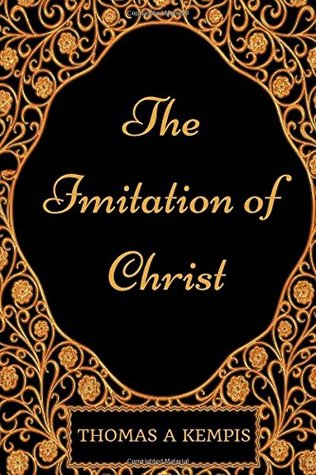
Leading From the Second Chair: Serving Your Church, Fulfilling Your Role, and Realizing Your Dreams
Mike Bonem & Roger Patterson
This book will raise awareness of the need for strong leaders in secondary positions. It will describe the value they can bring to their organization and to primary leaders when they are serving at their full potential. It will reshape the way they view their role, with an emphasis on their own responsibility as leaders. It recognizes the unique challenges and frustrations of serving in a subordinate position and equips these leaders with the attitudes and skills that they will need to survive and thrive in this new paradigm. Because of the scarcity of resources for second chair leaders, particularly those in the church, this book will offer a practical way to improve the performance of any organization. Leading Congregational Change discussed the importance of a “vision community”–a diverse group of key members who discern and implement the vision for a congregation–to guide the transformation of a church. This work will extend the theme of an empowered leadership team as we explore how individual clergy and laity can lead effectively.
“If you are a second chair leader, are considering a second chair role, or work with a second chair leader, this book is a must read! Mike Bonem and Roger Patterson have done a superb job of defining the living paradoxes a second chair leader deals with day in and day out. Don’t consider a second chair role without reading this book first.” –Warren Schuh
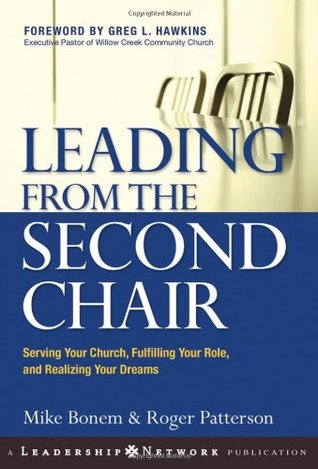
The Surge: Churches Catching the Wave of Christ’s Love for the Nations
Pete Briscoe & Todd Hillard
According to the way that we normally measure “success” and “progress,” things seem to be going in the wrong direction, writes author Pete Briscoe. Western Christianity, as a whole, is losing ground. The data indicates that the North American church is following the footsteps of our European spiritual ancestors into post-Christian society. Briscoe calls this time in history “Dry Lands.” And its symptoms include Christians feeling spiritually thirsty and tired, like they’ve been wandering through brush and thistles. They may even start to wonder, “Does it really matter? Is it really worth it?” Pete and his wife felt that way.
After a particularly difficult year, they were just about ready to call it quits. With refreshing candor, Briscoe asks, “Don’t we all draw back and question the very premise of our faith”? How about you? Are you experiencing your own trial in the “dry land” of life? If so, you’re not alone. But take heart. Help is on the way. According to Briscoe, there’s a flood coming. A flood of God’s Spirit to rain down on this world. A tsunami of praise that’s rising up across the globe. “For the sake of your soul and the strength of your church, it’s time to be submerged in the life-giving waters of God’s global passions,” he writes. The Surge provides encouragement and hope to Christians who feel too weary to continue. It’s a book for people who live in a “dry land” – and desperately need God to refresh them.
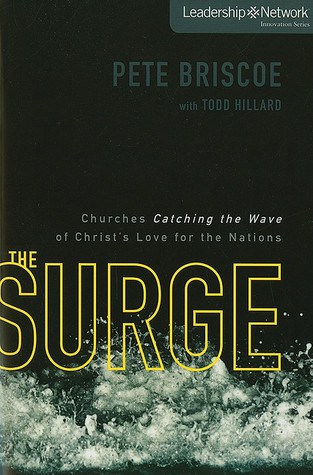
Cracking Your Church’s Culture Code: Seven Keys to Unleashing Vision and Inspiration
Samuel R. Chand
Why is it that the best strategic plans and good leadership often are not able to move churches in the desired direction? Sam Chand contends that toxic culture is to blame. Quite often, leaders don’t sense the toxicity, but it poisons their relationships and derails their vision. This work describes five easily identifiable categories of church culture (inspiring-accepting-stagnant-discouraging-toxic), with diagnostic descriptions in the book and a separate online assessment tool. The reader will be able to identify strengths and needs of their church’s culture, and then apply practical strategies (communication, control and authority, selection and placement of personnel, etc.) to make their church’s culture more positive.
Discusses how to diagnose the state of a church’s culture Reveals what it takes to put in place effective strategies for creating a more positive church culture Author served on the board of EQUIP (Dr. John Maxwell’s Ministry), equipping five million leaders world-wide. This important book offers a clear guide for understanding and recreating a healthy church culture.
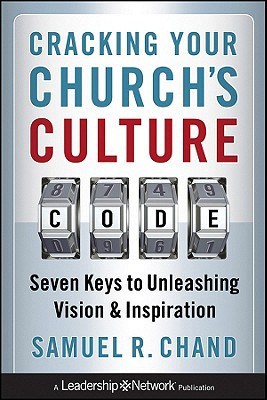
Good to Great and the Social Sectors: A Monograph to Accompany Good to Great
Jim Collins
Building upon the concepts introduced in Good to Great, Jim Collins answers the most commonly asked questions raised by his readers in the social sectors. Using information gathered from interviews with over 100 social sector leaders, Jim Collins shows that his “Level 5 Leader” and other good-to-great principles can help social sector organizations make the leap to greatness.
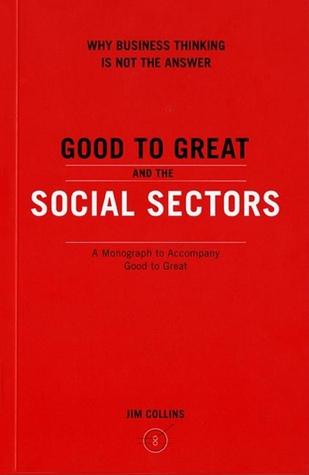
Building a Healthy Multi-Ethnic Church: Mandate, Commitments, and Practices of a Diverse Congregation
Mark DeYmaz
Through personal stories, proven experience and a thorough analysis of the biblical text, Building a Healthy Multi-ethnic Churchillustrates both the biblical mandate for the multi-ethnic church as well as the seven core commitments required to bring it about. Mark DeYmaz, pastor of one of the most proven multi-ethnic churches in the country, writes both from his experience and his extensive study of how to plant, grow, and encourage more ethnically diverse churches. He argues that the “homogenous unit principle” will soon become irrelevant and that the most effective way to spread the Gospel in an increasingly diverse world is through strong and vital multi-ethnic churches.
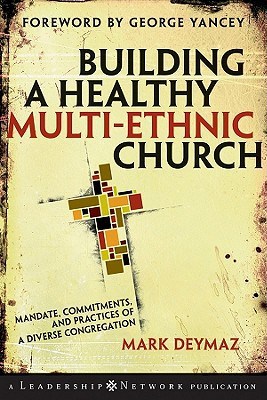
Elders and Leaders: God’s Plan for Leading the Church – A Biblical, Historical, and Cultural Perspective
Gene Getz
Strong leadership in the church is exactly what God had in mind. However, very few people, Gene Getz believes, understand the biblical pattern for church leadership. He has written Elders and Leaders to unravel the mystery and alleviate the confusion surrounding this critical topic. In the first part of the book, Getz lays the historical and biblical groundwork for the position of elder. In the second part, he shares how he has applied or has seen these principles applied over the years.
“Several reviewers compare ‘Elders and Leaders’ by Gene Getz to another book on church eldership called ‘Biblical Eldership’ by Alexander Strauch. As with Strauch, Getz presents the biblical texts very well. He also includes writings of the early church fathers up to the 3rd century. What Getz does differently than Strauch is that he keeps the ‘pure text’ work to the front of the book so elders of all size and type churches can read this as ‘pure’ biblical exegesis. Later Getz draws conclusions which come from pastoring large, elder-led churches for over 3 decades” –Brad Smith
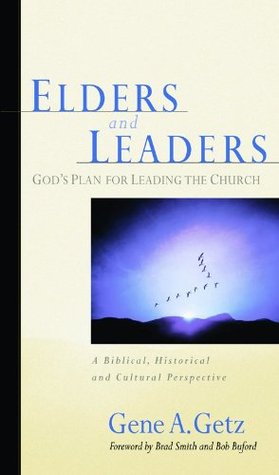
Reconciliation Blues: A Black Evangelical’s Inside View of White Christianity
Edward Gilbreath
Merit Award, 2007 Christianity Today Christianity and Culture Book What is the state of racial reconciliation in evangelical churches today? Are we truly united? In Reconciliation Blues journalist Edward Gilbreath gives an insightful, honest picture of both the history and the present state of racial reconciliation in evangelical churches. He looks at a wide range of figures, such as Howard O. Jones, Tom Skinner, Dr. Martin Luther King Jr., Jesse Jackson and John Perkins. Charting progress as well as setbacks, his words offer encouragement for black evangelicals feeling alone, clarity for white evangelicals who want to understand more deeply, and fresh vision for all who want to move forward toward Christ’s prayer “that all of them may be one.”
Edward Gilbreath is one of the nation’s foremost journalists on Christianity and race. Reconciliation Blues is a spellbinding first-person look into his world as he navigated white evangelicalism. In the process, we are provided with both a powerful teaching tool and an eye-opening journey into what is white about American Christianity. People of all backgrounds will learn much by reading this engaging book. —Michael O. Emerson, Professor and Author
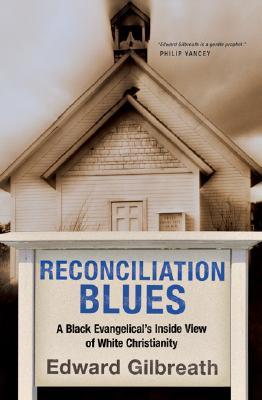
The Christian Atheist: Believing in God but Living As If He Doesn’t Exist
Craig Groeschel
“The more I looked, the more I found Christian Atheists everywhere.”
Former Christian Atheist Craig Groeschel knows his subject all too well. After over a decade of successful ministry, he had to make a painful self admission: although he believed in God, he was leading his church like God didn’t exist.
To Christians and non-Christians alike, to the churched and the unchurched, the journey leading up to Groeschel’s admission and the journey that follows—from his family and his upbringing to the lackluster and even diametrically opposed expressions of faith he encountered—will look and sound like the story of their own lives.
Now the founding and senior pastor of the multicampus, pace-setting LifeChurch.tv, Groeschel’s personal journey toward a more authentic God-honoring life is more relevant than ever.
Christians and Christian Atheists everywhere will be nodding their heads as they are challenged to take their own honest moment and ask the question: am I putting my whole faith in God but still living as if everything was up to me?
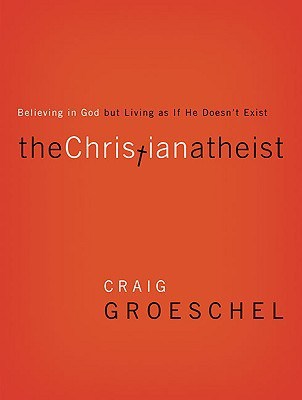
Switch: How to Change Things When Change is Hard
Chip Heath and Dan Heath
Why is change so difficult and frightening? How do you create change when you have few resources and no title or authority to back you up? Chip and Dan Heath, the best-selling authors of Made to Stick, are back with a ground-breaking book that addresses one of the greatest challenges of our personal and professional lives — how to change things when change is hard.
In their follow-up book to the critically acclaimed international bestseller Made to Stick, Chip and Dan Heath talk about how difficult change is in our companies, our careers, and our lives, why change is so hard, and how we can overcome our resistance and make change happen. The Heaths liken the human mind to two distinct entities — the animal mind, or what psychologist Jonathan Haidt calls the elephant, and the logical brain, which Haidt describes as the rider. The elephant is instinctive; it acts on emotion. It likes gorging on Oreos and sleeping in. And it loves routines — doing things the same old way, every day.
The rider is the planner and thinker. The rider obsesses about the future. He or she wants to stop eating junk food and stop hitting the snooze button. But it’s hard, because when the rider and elephant disagree on where to go, the rider usually loses. And that describes the essential tension between our primitive emotional brain and our high intellect, and helps to explain why changing how we behave is so difficult. The secret to making a switch is understanding this odd couple relationship. Direct the Rider. Motivate the Elephant. Shape the Path.
Throughout Switch, Chip and Dan Heath illustrate and explain situations in which sweeping change was adopted, from a university researcher who ended the cycle of child abuse in a group of families, to an entrepreneur who turned his skeptical employees into customer service zealots and saved his company.
In the tradition of Made to Stick, Blink, and Outliers, Switch is filled with engaging and entertaining stories of how companies and individuals have brought about and sustained significant change. An indispensable guide to making change happen, it is certain to become a classic.
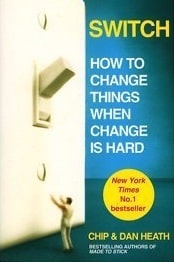
Missional Renaissance: Changing the Scorecard for the Church
Reggie McNeal
Reggie McNeal’s bestseller The Present Future is the definitive work on the “missional movement,” i.e., the widespread movement among Protestant churches to be less inwardly focused and more oriented toward the culture and community around them. In that book he asked the tough questions that churches needed to entertain to begin to think about who they are and what they are doing; in Missional Renaissance, he shows them the three significant shifts in their thinking and behavior that they need to make that will allow leaders to chart a course toward being missional: (1) from an internal to an external focus, ending the church as exclusive social club model; (2) from running programs and ministries to developing people as its core activity; and (3) from professional leadership to leadership that is shared by everyone in the community. With in-depth discussions of the “what” and the “how” of transitioning to being a missional church, readers will be equipped to move into what McNeal sees as the most viable future for Christianity. For all those thousands of churches who are asking about what to do next after reading The Present Future, Missional Renaissance will provide the answer.
This is Reggie McNeal’s gift to the church of the twenty-first century and his finest and most thorough work to date. This book clearly defines the shifts necessary to gauge what matters most for the missional people of God. —Eric Swanson, Co-author of The Externally Focused Church and Living a Life on Loan
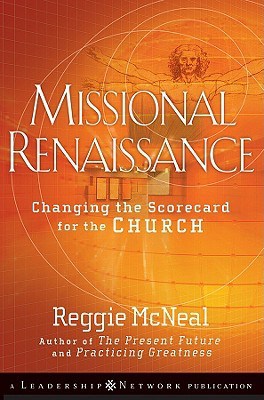
The Present Future: Six Tough Questions for the Church
Reggie McNeal
In this provocative book, author, consultant, and church leadership developer Reggie McNeal debunks these and other old assumptions and provides an overall strategy to help church leaders move forward in an entirely different and much more effective way. McNeal identifies the six most important realities that church leaders must address including: recapturing the spirit of Christianity and replacing “church growth” with a wider vision of kingdom growth; developing disciples instead of church members; fostering the rise of a new apostolic leadership; focusing on spiritual formation rather than church programs; and shift, from prediction and planning to preparation for the challenges in an uncertain world.
McNeal contends that by changing the questions church leaders ask themselves about their congregations and their plans, they can frame the core issues and approach the future with new eyes, new purpose, and new ideas.
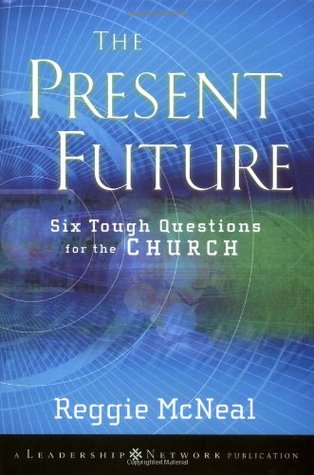
Money—God or Gift
Jamie Munson
Whatever you call it, the god of gold promises security, peace of mind, comfort, status, freedom, and all of our wildest dreams come true. From the Bible to the Beatles, however, our culture is filled with reminders that money can’t buy what actually matters in life.
And yet money still keeps us up at night. People worry about it, live for it, die for it, and even kill for it. “Money: God or Gift” presents a better way: Get money without getting greedy; Spend money without shame; Save money without stressing; Give money without guilt; Enjoy money as a gift without worshiping it as a god.
You’ll learn all of this and more as Jamie Munson discusses faith, stewardship, personal finance, and other money matters. Love it or hate it, we can’t afford to ignore it. Master your money or it will master you.
Put money in its proper place, and be free.
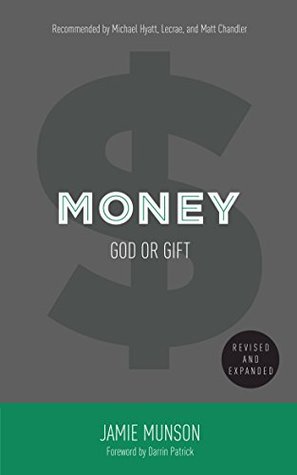
Sticky Teams: Keeping Your Leadership Team and Staff on the Same Page
Larry Osborne
Serving as a church leader can be a tough assignment. Whatever your role, odds are you’ve known your share of the frustration, conflict, and disillusionment that comes with silly turf battles, conflicting vision, and marathon meetings. No doubt, you’ve asked yourself, “How did it get this way?” With practical and accessible wisdom, Larry Osborne explains how it got this way. He exposes the hidden roadblocks, structures, and goofy thinking that sabotage even the best intentioned teams.
Then with time-tested and proven strategies he shows what it takes to get (and keep) a board, staff, and congregation on the same page. Whatever your situation; from start-up phase, to mid-sized, to megachurch, Osborne has been there. As the pastor of North Coast Church he’s walked his board, staff, and congregation through the process. Now with warm encouragement and penetrating insights he shares his secrets to building and maintaining a healthy and unified ministry team that sticks together for the long haul.
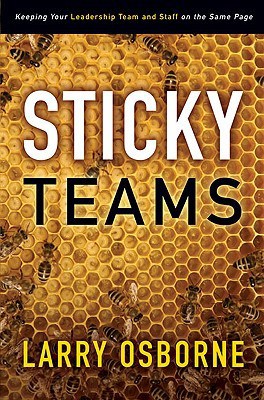
Drive: The Surprising Truth About What Motivates Us
Daniel H. Pink
Forget everything you thought you knew about how to motivate people—at work, at school, at home. It’s wrong. As Daniel H. Pink (author of To Sell Is Human: The Surprising Truth About Motivating Others) explains in his paradigm-shattering book Drive, the secret to high performance and satisfaction in today’s world is the deeply human need to direct our own lives, to learn and create new things, and to do better by ourselves and our world.
Drawing on four decades of scientific research on human motivation, Pink exposes the mismatch between what science knows and what business does—and how that affects every aspect of our lives. He demonstrates that while the old-fashioned carrot-and-stick approach worked successfully in the 20th century, it’s precisely the wrong way to motivate people for today’s challenges. In Drive, he reveals the three elements of true motivation: Autonomy—the desire to direct our own lives, Mastery—the urge to get better and better at something that matters, Purpose—the yearning to do what we do in the service of something larger than ourselves.
Along the way, he takes us to companies that are enlisting new approaches to motivation and introduces us to the scientists and entrepreneurs who are pointing a bold way forward.
Drive is bursting with big ideas—the rare book that will change how you think and transform how you live.
